历年高考英语听力材料分析
- 格式:docx
- 大小:37.92 KB
- 文档页数:4
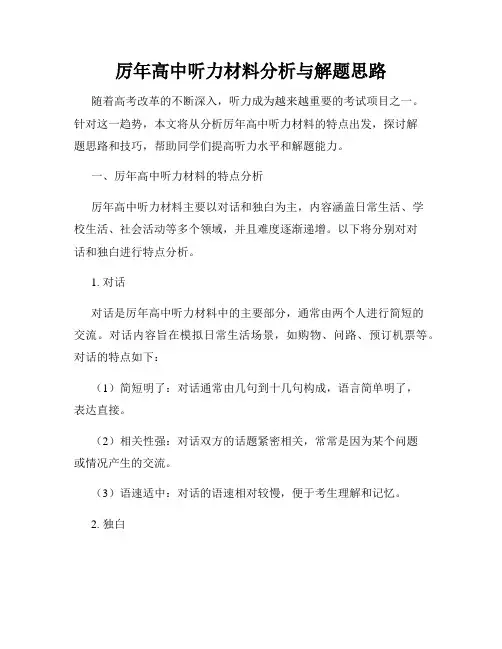
厉年高中听力材料分析与解题思路随着高考改革的不断深入,听力成为越来越重要的考试项目之一。
针对这一趋势,本文将从分析厉年高中听力材料的特点出发,探讨解题思路和技巧,帮助同学们提高听力水平和解题能力。
一、厉年高中听力材料的特点分析厉年高中听力材料主要以对话和独白为主,内容涵盖日常生活、学校生活、社会活动等多个领域,并且难度逐渐递增。
以下将分别对对话和独白进行特点分析。
1. 对话对话是厉年高中听力材料中的主要部分,通常由两个人进行简短的交流。
对话内容旨在模拟日常生活场景,如购物、问路、预订机票等。
对话的特点如下:(1)简短明了:对话通常由几句到十几句构成,语言简单明了,表达直接。
(2)相关性强:对话双方的话题紧密相关,常常是因为某个问题或情况产生的交流。
(3)语速适中:对话的语速相对较慢,便于考生理解和记忆。
2. 独白独白是厉年高中听力材料中的另一个重要部分,通常由一位讲述者进行长时间的单向说明。
独白内容涉及学校介绍、导览、广播等。
独白的特点如下:(1)内容丰富:独白内容较为详细,给出了详细的信息和背景知识。
(2)语速适中:独白的语速相对对话较快,但仍然可接受。
(3)语气抒情:独白往往带有一定的情感,通过语调和语气的变化来强调或表达特定的信息。
二、解题思路和技巧1. 预测题目内容在开始听力材料之前,快速浏览题目,对于对话或独白的主题、人物、地点等进行推测,有助于我们有一个大致的框架。
这可以帮助我们更好地理解听力材料中的信息。
2. 抓住关键词聆听时,要注意抓住关键词,包括人名、地点、时间、数字、事物等。
这些关键词往往对于理解整个材料起到关键作用。
3. 注意同义替换和反义表达部分问题和材料中的表达方式可能存在同义替换或反义表达。
因此,我们要注意在听的过程中发现这些变化,并及时进行匹配。
4. 利用上下文关系在理解材料时,我们可以通过上下文的提示和线索来推断词语的意思或故事的发展。
上下文关系往往能够帮助我们解决一些理解上的困惑。
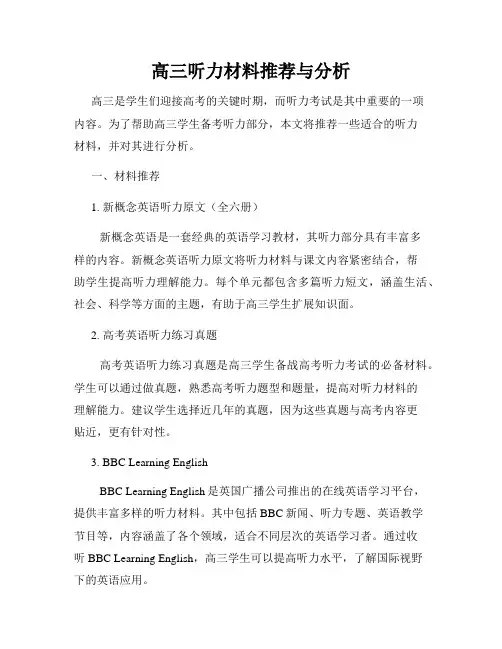
高三听力材料推荐与分析高三是学生们迎接高考的关键时期,而听力考试是其中重要的一项内容。
为了帮助高三学生备考听力部分,本文将推荐一些适合的听力材料,并对其进行分析。
一、材料推荐1. 新概念英语听力原文(全六册)新概念英语是一套经典的英语学习教材,其听力部分具有丰富多样的内容。
新概念英语听力原文将听力材料与课文内容紧密结合,帮助学生提高听力理解能力。
每个单元都包含多篇听力短文,涵盖生活、社会、科学等方面的主题,有助于高三学生扩展知识面。
2. 高考英语听力练习真题高考英语听力练习真题是高三学生备战高考听力考试的必备材料。
学生可以通过做真题,熟悉高考听力题型和题量,提高对听力材料的理解能力。
建议学生选择近几年的真题,因为这些真题与高考内容更贴近,更有针对性。
3. BBC Learning EnglishBBC Learning English是英国广播公司推出的在线英语学习平台,提供丰富多样的听力材料。
其中包括BBC新闻、听力专题、英语教学节目等,内容涵盖了各个领域,适合不同层次的英语学习者。
通过收听BBC Learning English,高三学生可以提高听力水平,了解国际视野下的英语应用。
二、材料分析1. 新概念英语听力原文(全六册)新概念英语听力原文是经典教材,有助于高三学生全面提升听力技能。
该材料在内容上涵盖广泛,既有日常生活对话,也有社会问题和科学知识的讲解。
学生可以通过反复听和跟读,提高对不同口音和语速的理解能力,同时扩展词汇量和语法应用能力。
2. 高考英语听力练习真题做高考英语听力练习真题有助于高三学生熟悉考试题型和要求,提高应对高考听力的能力。
学生可以通过分析真题中的听力材料,了解重点信息的抓取方式和听力技巧。
此外,做真题还可以帮助学生提高答题速度和准确度,熟悉高考听力的时间分配。
3. BBC Learning EnglishBBC Learning English提供的听力材料具有高质量和高度真实性,可以锻炼高三学生的听力技能。
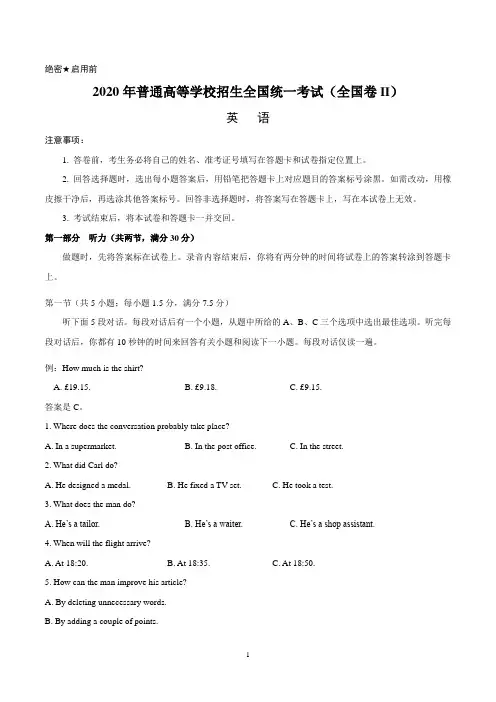
绝密★启用前2020年普通高等学校招生全国统一考试(全国卷II)英语注意事项:1. 答卷前,考生务必将自己的姓名、准考证号填写在答题卡和试卷指定位置上。
2. 回答选择题时,选出每小题答案后,用铅笔把答题卡上对应题目的答案标号涂黑。
如需改动,用橡皮擦干净后,再选涂其他答案标号。
回答非选择题时,将答案写在答题卡上,写在本试卷上无效。
3. 考试结束后,将本试卷和答题卡一并交回。
第一部分听力(共两节,满分30分)做题时,先将答案标在试卷上。
录音内容结束后,你将有两分钟的时间将试卷上的答案转涂到答题卡上。
第一节(共5小题;每小题1.5分,满分7.5分)听下面5段对话。
每段对话后有一个小题,从题中所给的A、B、C三个选项中选出最佳选项。
听完每段对话后,你都有10秒钟的时间来回答有关小题和阅读下一小题。
每段对话仅读一遍。
例:How much is the shirt?A. £19.15.B. £9.18.C. £9.15.答案是C。
1. Where does the conversation probably take place?A. In a supermarket.B. In the post office.C. In the street.2. What did Carl do?A. He designed a medal.B. He fixed a TV set.C. He took a test.3. What does the man do?A. He’s a tailor.B. He’s a waiter.C. He’s a shop assistant.4. When will the flight arrive?A. At 18:20.B. At 18:35.C. At 18:50.5. How can the man improve his article?A. By deleting unnecessary words.B. By adding a couple of points.C. By correcting grammar mistakes.第二节(共15小题;每小题1.5分,满分22.5分)听下面5段对话或独白。
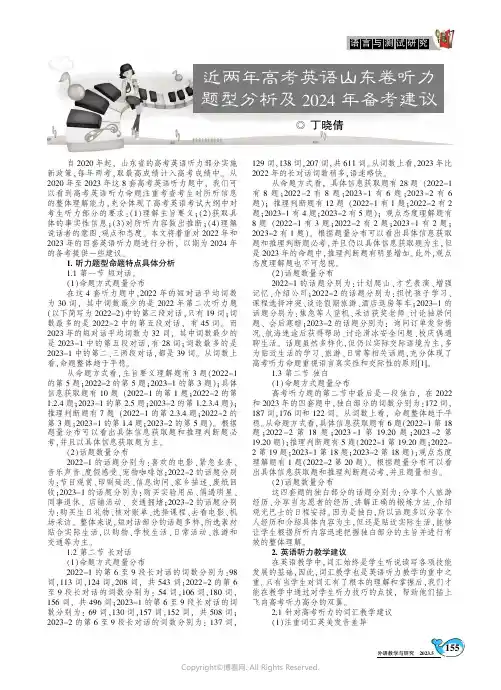
近两年高考英语山东卷听力题型分析及2024年备考建议◎丁晓倩自2020年起,山东省的高考英语听力部分实施新政策,每年两考,取最高成绩计入高考成绩中。
从2020年至2023年这8套高考英语听力题中,我们可以看到高考英语听力命题注重考查考生对所听信息的整体理解能力,充分体现了高考英语考试大纲中对考生听力部分的要求:(1)理解主旨要义;(2)获取具体的事实性信息;(3)对所听内容做出推断;(4)理解说话者的意图、观点和态度。
本文将着重对2022年和2023年的四套英语听力题进行分析,以期为2024年的备考提供一些建议。
1.听力题型命题特点具体分析1.1第一节短对话。
(1)命题方式题量分布在这4套听力题中,2022年的短对话平均词数为30词,其中词数最少的是2022年第二次听力题(以下简写为2022-2)中的第三段对话,只有19词;词数最多的是2022-2中的第五段对话,有45词。
而2023年的短对话平均词数为32词,其中词数最少的是2023-1中的第五段对话,有28词;词数最多的是2023-1中的第二、三两段对话,都是39词。
从词数上看,命题整体趋于平稳。
从命题方式看,主旨要义理解题有3题(2022-1的第5题;2022-2的第5题;2023-1的第3题);具体信息获取题有10题(2022-1的第1题;2022-2的第1.2.4题;2023-1的第2.5题;2023-2的第1.2.3.4题);推理判断题有7题(2022-1的第2.3.4题;2022-2的第3题;2023-1的第1.4题;2023-2的第5题)。
根据题量分布可以看出具体信息获取题和推理判断题必考,并且以具体信息获取题为主。
(2)话题数量分布2022-1的话题分别为:喜欢的电影、紧急业务、音乐声音、度假感受、宠物咖啡馆;2022-2的话题分别为:节目观赏、印刷延迟、信息询问、家乡描述、废纸回收;2023-1的话题分别为:购买实验用品、偶遇明星、同事退休、店铺活动、交通拥堵;2023-2的话题分别为:购买生日礼物、核对账单、选择课程、去看电影、机场采访。
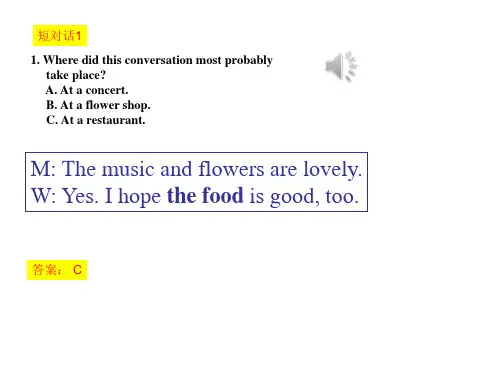
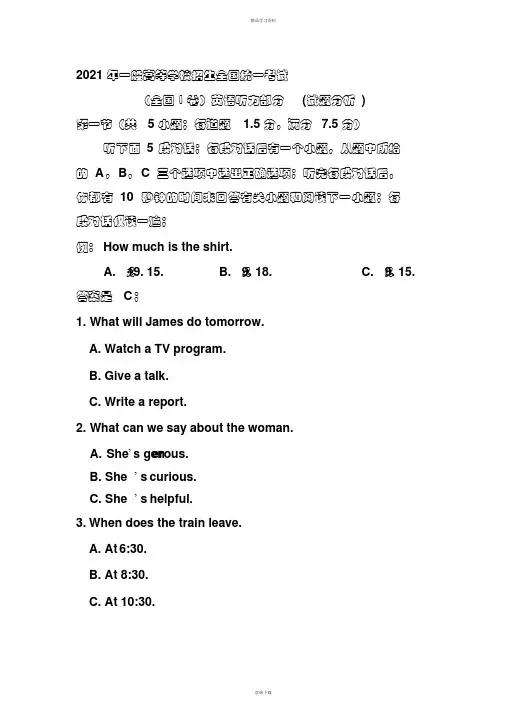
2021 年一般高等学校招生全国统一考试(全国Ⅰ卷)英语听力部分(试题分析)第一节(共 5 小题;每道题 1.5 分,满分7.5 分)听下面5 段对话;每段对话后有一个小题,从题中所给的A,B,C 三个选项中选出正确选项;听完每段对话后,你都有10 秒钟的时间来回答有关小题和阅读下一小题;每段对话仅读一遍;例:How much is the shirt.A. £19. 15.B. £9. 18.C. £9. 15. 答案是 C ;1. What will James do tomorrow.A. Watch a TV program.B. Give a talk.C. Write a report.2. What can we say about the woman.A. She’s ge e n rous.B. She ’ s curious.C. She ’ s helpful.3. When does the train leave.A. At 6:30.B. At 8:30.C. At 10:30.4. How does the woman go to work.A. By car.B. On foot.C. By bike.5. What is the probable relationship between the speakers.A. Classmates.B. Teacher and student.C. Doctor and patient.其次节(共15 小题;每道题 1.5 分,满分22.5 分)听下面 5 段对话或独白;每段对话或独白后有几个小题,从题中所给的 A ,B,C 三个选项中选出正确选项;听每段对话或独白前,你将有时间阅读各个小题,每道题 5 秒钟;听完后,各小题将给出 5 秒钟的作答时间;每段对话或独白读两遍;听第 6 段材料,回答第6,7 题;6. What does the woman regret.A. Giving up her research.B. Dropping out of college.C. Changing her major.7. What is the woman interested in studying now.A. Ecology.B. Education.C. Chemistry.听第7 段材料,回答第8,9 题;8. What is the man.A. A hotel manager.B. A tour guide.C. A taxi driver.9. What is the man doing for the woman.A. Looking for some local foods.B. Showing her around the seaside.C. Offering information about a hotel.听第8 段材料,回答第10 至12 题;10. Where does the conversation probably take place.A. In an office.B. At home.C. At a restaurant.11. What will the speakers do tomorrow evening.A. Go to a concert.B. Visit a friend.C. Work extra hours.12. Who is Alice going to call.A. Mike.B. Joan.C. Catherine.听第9 段材料,回答第13 至16 题;13. Why does the woman meet the man.A. To look at an apartment.B. To deliver some furniture.C. To have a meal together.14. What does the woman like about the carpet.A. Its color.B. Its design.C. Its quality.15. What does the man say about the kitchen.A. It ’ s a good size.B. It ’ s newly painted.C. It ’ s adequately equipped.16. What will the woman probably do next.A. Go downtown.B. Talk with her friend.C. Make payment.听第10 段材料,回答第17 至20 题;17. Who is the speaker probably talking to.A. Movie fans.B. News reporters.C. College students.18. When did the speaker take English classes.A. Before he left his hometown.B. After he came to America.C. When he was 15 years old.19. How does the speaker feel about his teacher.A. He ’ s proud.B. He ’ s sympathetic.C. He ’ s grateful.20. What does the speaker mainly talk about.A. How education shaped his life.B. How his language skills improved.C. How he managed his business well.录音稿(Text 1)W: James, you ’ ve been watching TV for the whole evening.What’ s on.M: It ’ s a science program on the origin of the universe. I give a presentation on it in my class tomorrow.(Text 2)M: Hello, do you have The Best of Mozart.W: Um, sorry. We ’ ve just sold out, but we can order one for you. If you give us your number, we ’ ll call you when the CD arrives.(Text 3)W: We’ d better be going now, or we ’ ll be late for the train. M: No rush. It ’ s 8:30 now. We still have two hours.(Text 4)M: I am so tired of driving all those hours to work.W: Yeah, I know what you mean. I used to drive two hours to work each way. But now I live within walking distanceof my office. I don ’ t even need a bike.(Text 5)W: Hi Andy. I didn ’s t ee you in Professor Smith ’s c lass yesterday. What happened.M: Well, I had a headache, so I called him and asked for sick leave.(Text 6)W: The biggest mistake I made, uh, was leaving college in my last year, and not completing my education. So I ’mthinking of going back to school.M: School. To study what.W: Ecology. I ’minterested in the relationship betweenhumans and nature.M: Cool. Is it what you studied years ago.W: No, I majored in chemistry then.(Text 7)M: Good morning, madam. I ’m your guide for this p.triW: How lovely. Could you tell me about the hotel I ’ m going to stay at.M: Yes, of course. The Grand Hotel opened in 1990 and it sits on the seaside along the South Coast Highway. It isthe most beautiful hotel here.W: That sounds great.M: And there are some restaurants outside. So at dinner time, you ’ d have a lot of choices.W: That ’ s really nice. I like t o have some local foods while traveling. What about the scenery around it.M: The hotel has the best views of the Pacific Ocean.W: Oh, I think I will love this hotel.(Text 8)W: Hi, Mike.M: Hi, Alice. Nice to see you. You don ’ t often come here.W: I usually have fast food delivered to my office. Just came here for a change today.M: The environment here is good, clean and relatively quiet.W: Yeah, and I heard the food is tasty. By the way, are yougoing to the concert tomorrow evening.M: Yes. Are you.W: Yeah, Catherine was supposed to go with me, but she may have to work extra hours tomorrow. Do you knowanyone who might like to go.M: No. But if you like, I can ask around. Er, Joan might want to go.W: Oh, yes, she is a great fan of classical music. I ’ ll givea ring after lunch.(Text 9)W: Hi, I ’ ve only just arrived.M: Oh, good. Now here are the keys. Let ’ s go in. There are two apartments. The one for rent is on the right. Docome in.W: Thank you. I like the carpet. The color is nice, isn ’t M: Yes, and this apartment is in good condition. Here is yourlounge.W: Where would we eat.M: There is this corner here, or you can use your kitchen.Come and see.W: The kitchen is quite small.M: Yes, but it has everything, cooker, fridge, even a dishwasher.W: And there are lots of cupboards.M: Let me show you the bedrooms. This is the smaller one. W: It ’ s a good size, though.M: Now come into the other bedroom. You can see the bathroom, too.W: Yes, it is very nice. But I will have to ask my friend first, and we will come together. I understand it is $800 a month.M: Yes, but a few blocks downtown would be much more expensive.W: Well, thank you. I will be in touch.(Text 10)M: Thank you very much. Thank you Dr. Johnson. Well, it is really great to be back at university again. The thing thatI want to tell you today is this: education is important.When I came to the U.S., I was only thinking about beinga carpenter, but I could not read the newspaper and Icould not understand the news on television or movies or anything like this, so I entered the city college to takeEnglish classes for foreign students. I was very proud that I was going to a college because no one in my family ever went to any college or to any university. You know, when you are 15 years old in my country, you finish school and then you learn a trade. And that ’esxactly what I did. When I was 15 years old, I learned how to bea carpenter. A year later, I came to America. Luckily, Imet a very good teacher who encouraged me to take some math classes, b usiness classes a nd history classes and I became a full-time college student. And today whenI look back, I ’m so happ ay u s b e ec y ou never know wherelife will take you. All of a sudden, I started making money, because I was really good at m ath. You know, how to work out everything with math is so important.This is something that I learned when I started my ownbusiness, which is doing really well.2021 年一般高等学校招生全国统一考试(全国I 卷)英语试题听力部分参考答案1. B2. C3. C4. B5. A6. B7. A8. B9. C 10. C11. A 12. B 13. A 14. A 15. C16. B 17. C 18. B 19. C 20. A〖解密〗2021 年高考英语全国I 卷听力试题简析1. 语速:143 词/分(比2021 年每分钟慢25 词)2. 录音稿总词数:843(比2021 年少51 词)3. 腔调:美音(没变)4. 录音人:Kris Chung, Laura Estelles (女声变化)详见以下统计:考点统计表猎取事实性的对所听内容作懂得说话者的年份懂得主旨和要义具体信息出简洁推断意图,观点和态度2021 1 12 6 12021 1 13 5 1录音数据统计表词数累计时间平均语速年份第一节其次节合计(一遍)(词/分2021 157 686 843 5′53″143 2021 173 721 894 5′19″168话题统计表第一节其次节年份Text Text Text Text Text Text Text Text Text Te1 2 3 4 5 6 7 8 9 10看电2021视赶火买CD车上班上课交通缺席教介绍餐馆复学看房的旅社偶遇要去法Juá评判2021电影国预备借阅的计聚会图书明白查找火车修鞋时间店铺商定去德餐馆的见面国工点餐热时间作划气答案分布表答案总数分布年份答案邻近分布A B CB C C B A BA B C C2021 6 7 7A B A A C B C B C AC A C B A C A B C B2021 7 6 7B C A B A B C A C A〖解密〗2021 年高考英语全国I 卷听力试题具体分析注:蓝色标记为对比往年新增分析角度听力部分要求考生听懂有关日常生活中所熟识的话题,如:看电视,买CD ,赶火车,上班交通,上课缺席,复学,介绍旅社,餐馆偶遇,看房,谈训练的重要性;与往常相同,听力部分中有10 段听力材料,其中的 5 段较短,另 5 段就较长;话题掩盖面广,对话内容规律清晰,话语流畅;所考查的听力微技能包括:懂得主旨和要义,猎取事实性的具体信息,对所听内容作出简洁推断,懂得谈话人的意图,观点和态度;问题涉及多个方面,多个角度,采纳where-, when-, why-, how-, what- 等多种特别疑问句;录音人:男:Kris Chung; 女: Laura Estelles口音:美音词数:843时间:5 分53 秒语速:143 词/分难度:难度整体与2021 年持平考点:2021 年全国I 卷高考英语听力的20 个小题中,考查懂得主旨与要义的 1 个题,猎取事实性的具体信息的12 个题,对所听内容作出推断的 6 个题,懂得说话者的意图,观点和态度的 1 个题,较好地表达了考试大纲和考试说明对考生的要求;第一节(Text 1)W: James, you ’ve been watchin T g V for the whole evening.What’ s on.M: It ’ s a science program on the origin of the universe. I give a presentation on it in my class tomorrow.(词数:31;时间:13″;语速:143 词/分)1. What will James do tomorrow.A. Watch a TV program.B. Give a talk.C. Write a report.【分析】考查考生猎取事实性具体信息的才能;由最后一句I ’llgive a presentation on it in my class tomorrow. 可知答案;give a presentation 与选项give a talk同义互换;【答案】B【语言学问】1. the origin of ⋯的起源2. give a presentation 作报告【语音】连读James, you ’ ve been watching TV f o h r e t whole evening.I ’ll v g e i a presentation on it in my class tomorrow.(Text 2)M: Hello, do you have The Best of Mozart.W: Um , sorry. We ’ ve just sold out, but we can order one for you. If you give us your number, we ’ ll call you when the CD arrives.(词数:34 ;时间:14″;语速:146 词/分)2. What can we say about the woman.A. She’ s generous.B. She ’ s curious.C. She ’ s helpful.【分析】考查考生对所听内容作出简洁推断的才能;女士说男士想要的CD 刚卖完,假如男士想预订的话,可以留下电话号码,CD 到货之后会通知他;由此可见,女士是乐于助人的;【答案】C【语言学问】sell out 卖光;脱销(Text 3)W: We’ d better begoing now, or we ’ ll be late for the train. M: No rush. It ’ s 8:30 now. We still have two hours.(词数:22;时间:9″;语速:147 词/分)3. When does the train leave.A. At 6:30.B. At 8:30.C. At 10:30.【分析】考查考生猎取事实性具体信息的才能;由男士的话It ’s 8:30 now. We still have two hours. 可知火车10:30 动身;【答案】C【语言学问】no rush 不用急(Text 4)M: I am so tired of driving all those hours to work.W: Yeah, I know what you mean. I used to drive two hours to work each way. But now I live within walking distance of my office. I don ’t even need a bike.(词数:43;时间:17″;语速:152 词/分)4. How does the woman go to work.A. By car.B. On foot.C. By bike.【分析】考查考生猎取事实性具体信息的才能;女士说她家离工作地点很近,走着就到了,甚至连自行车都不用,由此可知女士步行去上班;【点拨】此题难点在于对within walking distance of 的懂得,其义为“(距离⋯)很近,走着就到了”;【答案】B【语言学问】within walking distance (of sth) (距离⋯)很近,走着就到了【语音】重读I used to drive two hours to work each way, but now I live within walking distance of my office.(Text 5)W: Hi Andy. I didn ’s t ee you in Professor Smith ’s c lass yesterday. What happened.M: Well, I had a headache, so I called him and asked for sick leave.(词数:27;时间:12″;语速:135 词/分)5. What is the probable relationship between the speakers.A. Classmates.B. Teacher and student.C. Doctor and patient.【分析】考查考生对所听内容作出简洁推断的才能;由女士的话I didn’t s ee you in Professor Smith’sclass yesterday.可知他们是同班同学;【答案】A【语言学问】ask for sick leave 请病假W: The biggest mistake I made, uh, was leaving college inmy last year, and not completing my education. So I ’ m thinking of going back to school. M: School. To study what. W: Ecology. I ’ minterestedin humans and nature.the relationship betweenM: Cool. Is it what you studied years ago. W: No, I majored in chemistry then.(词数: 54;时间: 27″;语速: 120 词/分)其次节听第 6 段材料,回答第 6,7 题; (Text 6)材料内容为复学;主要是女士懊悔辍学而想返校学习; 6. What does the woman regret.A. Giving up her research.B. Dropping out of college.C. Changing her major.【分析】考查考生猎取事实性具体信息的才能;由 女 士 所 说 的 The biggest mistake I made, uh, was leaving college in my last year, and not completing my education. 可知,女士很懊悔中途辍学,没有完成学业;【点拨】题干中的 regret 与材料中的 the biggest mistake 呼应, B 选项中的 drop out of college 与材料中的 leaving college in my last year, and not completing my education 呼应; 【答案】 B7. What is the woman interested in studying now.A. Ecology.B. Education.C. Chemistry.【分析】考查考生猎取事实性具体信息的才能;男士问女士回学校想学什么,女士回答生态学,然后说她对人类与自然的关系很感爱好,由此可知,女士现在对学习生态学感爱好; 【答案】 A听第 7 段材料,回答第 8,9 题; (Text 7)’ m goingM: Good morning, madam. I’ m your guide for this trip.W: How lovely. Could you tell me about the hotel Ito stay at.M: Yes, of course. The Grand Hotel opened in 1990 and itsits on the seaside along the South Coast Highway. It is the most beautiful hotel here.W: That sounds great.M: And there are some restaurants outside. So at dinner time, you ’ d have a lot of choices.W: That ’s really nice. I like to have some local foods while traveling. What about the scenery around it.M: The hotel has the best views of the Pacific Ocean.W: Oh, I think I will love this hotel.(词数:105;时间:45″;语速:140 词/分)材料内容为导游介绍旅社相关情形;8. What is the man.A. A hotel manager.B. A tour guide.C. A taxi driver.【分析】考查考生猎取事实性具体信息的才能;由男士所说的I ’m your guide for this trip. 可知男士是一名导游;【答案】B9. What is the man doing for the woman.A. Looking for some local foods.B. Showing her around the seaside.C. Offering information about a hotel.【分析】考查考生猎取事实性具体信息的才能;由女士所说的Could you tell me about the hotel I ’m going to stay at. 以及最终女士所说的Oh, I think I will love this hotel.可知,男士在给女士介绍旅社的相关情形;【答案】C【语音】1. 意群与停顿The Grand Hotel opened in 1990 | and it sits on the seaside| along the South Coast Highway.2. 弱读I like to have some l ocal foods while traveling.听第8 段材料,回答第10 至12 题;(Text 8)W: Hi, Mike.M: Hi, Alice. Nice to see you. You don’t often come here.W: I usually have fast food delivered to my office. Just came here for a change today.M: The environment here is good, clean and relatively quiet.W: Yeah, and I heard the food is tasty. By the way, are you going to the concert tomorrow evening.M: Yes. Are you.W: Yeah, Catherine was supposed to go with me, but she may have to work extra hours tomorrow. Do you know anyone who might like to go.M: No. But if you like, I can ask around. Er, Joan might want to go.W: Oh, yes, she is a great fan of classical music. I ’l l give hera ring after lunch.(词数:117;时间:49″;语速:143 词/分)材料内容为餐馆偶遇小谈;10. Where does the conversation probably take place.A. In an office.B. At home.C. At a restaurant.【分析】考查考生对所听内容作出简洁推断的才能;男士遇到女士说You don’t often come here.而女士回答说她通常是叫外卖,今日只是想换换口味,而且女士接着说她听说这儿食物很好吃,由此可知他们是在餐馆偶遇;【答案】C11. What will the speakers do tomorrow evening.A. Go to a concert.B. Visit a friend.C. Work extra hours.【分析】考查考生猎取事实性具体信息的才能;女士问男士明晚是否去参与音乐会,男士给与了确定回答并问女士是否也去,女士也给出了确定答案,可知他们明晚都会去参与音乐会;【答案】A12. Who is Alice going to call.A. Mike.B. Joan.C. Catherine.【分析】考查考生猎取事实性具体信息的才能;男士说Joan 可能想去参与音乐会,然后女士说Oh, yes, she is a great fan of classical music. I ’ll give her a ring after lunch. 可知Alice 准备给Joan 打电话;【答案】B【语言学问】relatively adv 比较而言;相对地be supposed to do sth应当做某事give sb a ring 给某人打电话【语音】1. 失去爆破I usually have fast foo(d) deliver(ed) to my office.2. 连读But if you like, I ca n ask around.She is a great fan of classical music.听第9 段材料,回答第13 至16 题;(Text 9)W: Hi, I ’ve only just arriv. edM: Oh, good. Now here are the keys. Let ’ s go in. There are two apartments. The one for rent is on the right. Docome in.W: Thank you. I like the carpet. T he color is nice, isn ’ t it. M: Yes, and this apartment is in good condition. Here is your lounge.W: Where would we eat.M: There is this corner here, or you can use your kitchen.Come and see.W: The kitchen is quite small.M: Yes, but it has everything, cooker, fridge, even a dishwasher.W: And there are lots of cupboards.M: Let me show you the bedrooms. This is the smaller one.W: It ’ s a good size, though.M: Now come into the other bedroom. You can see the bathroom, too.W: Yes, it is very nice. But I will have to ask my friend first, and we will come together. I understand it is $800 a month.M: Yes, but a few blocks downtown would be much more expensive.W: Well, thank you. I will be in touch.(词数:167 时间:1′16″语速:132 词/分)材料内容是租房子;主要是男士给女士介绍要出租的房子;13. Why does the woman meet the man.A. To look at an apartment.B. To deliver some furniture.C. To have a meal together.【分析】考查考生对所听内容作出简洁推断的才能;男士说There are two apartments, the one for rent is on the right. 而且下文接着谈论房子里的各种设施,可以推断女士来见男士是要看房;【答案】A14. What does the woman like about the carpet.A. Its color.B. Its design.C. Its quality.【分析】考查考生猎取事实性具体信息的才能;可知’她t i t喜. 女士说I like the carpet. The color is nice, isn欢地毯的颜色;【答案】A15. What does the man say about the kitchen.A. It ’s a goi o z d e.sB. It ’ s newly painted.C. It ’ s adequately equipped.【分析】考查考生猎取事实性具体信息的才能;男士说it has everything, cooker, fridge, even a dishwasher,说明他认为厨房设施配备齐全;【答案】C16. What will the woman probably do next.A. Go downtown.B. Talk with her friend.C. Make payment.【分析】考查考生对所听内容作出简洁推断的才能;看完房子后女士说她要和伴侣商议一下,由此可以推断她接下来要和她的伴侣谈;【答案】B【语言学问】in good condition 状况良好a good size 相当大be in touch 保持联系【语音】1. 连读Let ’s g o (w)i n.Now come into the (j)other bedroom. ( 同时留意the 在元音前的发音)2. 失去爆破Yes, an(d) this apartment is in goo(d) condition.3. 语调There is this corner here, or you can use your kitchen.听第10 段材料,回答第17 至20 题;(Text 10)M :Thank you very much. Thank you Dr. Johnson. Well, it is really great to be back at university again. The thing that I want to tell you today is this: education is important. When I came to the U.S., I was onlythinking about being a carpenter, but I could not read the newspaper and I could not understand the news on television or movies or anything like this, so I entered the city college to take English classes for foreign students. I was very proud that I was going to a college because no one in my family ever went to any college or to anyuniversity. You know, when you are 15 years old in my country, you finish school and then you learn a trade. And that’s exactly what I did. When I was 15 years old, I learned how to be a carpenter. A year later, I came to America. Luckily, I met a very good teacher who encouraged me to take some m ath classes, business classes a nd history classesand I became a full-time college student. And today when I look back, I ’m so happy because you never know where life will take you. All of a sudden, I started making money, because I was really good at math. You know, how to work out everything with math is so important. This is something that I learned when I started my own business, which is doing really well.(词数:243;时间:1′31″;语速:160 词/分)材料内容主要涉及训练;说话者通过介绍自己的个人经受告知我们训练的重要性;17. Who is the speaker probably talking to.A. Movie fans.B. News reporters.C. College students.【分析】考查考生对所听的内容作出简洁推断的才能;说话者演讲之初就说Well, it is really great to be back atuniversity again. The thing that I want to tell you today isthis: education is important ,由此可以推断他是回到高校面向同学们演讲;【答案】C18. When did the speaker take English classes.A. Before he left his hometown.B. After he came to America.C. When he was 15 years old.【分析】考查考生猎取事实性具体信息的才能;说话者说他来到美国,不会读报,看不了电视新闻,也看不懂电影,因此他进入高校学习面对外国同学开设的英语课,由此可知他是来到美国后开头上英语课;【答案】B19. How does the speaker feel about his teacher.A. He ’ s proud.B. He ’ s sympathetic.C. He ’ s grateful.【分析】考查考生对说话者观点的懂得才能;由Luckily, I met a very good teacher who encouraged me to take some ...可知说话者很感恩遇到这样的一位老师;【答案】C20. What does the speaker mainly talk about.A. How education shaped his life.B. How his language skills improved.精品学习资料C. How he managed his business well.【分析】考查考生懂得主旨与要义的才能;说话者在一开头就强调训练很重要,然后谈及自身的经受,最终提及训练给自己的人生带来的变化,可知说话者主要是在谈论训练对其人生的影响;【答案】A【语言学问】trade n (尤指手工)职业;手艺;行当look back 回首(往事);回忆all of a sudden 突然;猛地work out 解决;把⋯弄清晰;算出【语音】1. 意群与停顿+ 失去爆破When I came to the U.S., | I was only thinking about being a carpenter, | but I coul(d) no(t) rea(d) the newspaper | and I coul(d) not understand(d) the news on television | or movies or anything like this, | so I enter (ed) the city college to take English classes for foreign students.2. 意群与停顿You know, when you are 15 years old in my country, | you finish school | and then you learn a trade.欢迎下载。


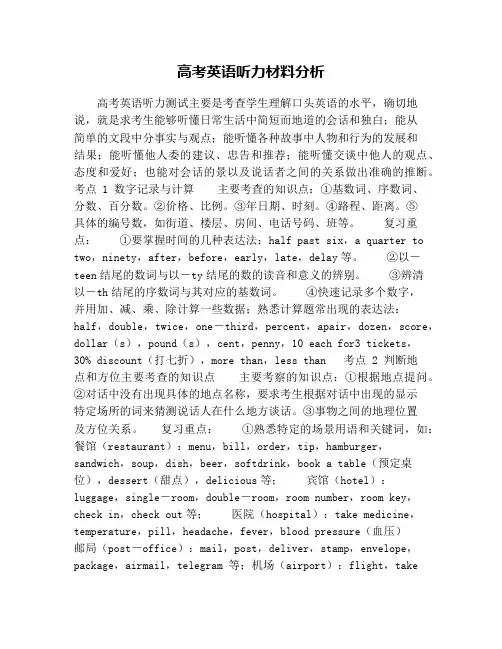
高考英语听力材料分析高考英语听力测试主要是考查学生理解口头英语的水平,确切地说,就是求考生能够听懂日常生活中简短而地道的会话和独白;能从简单的文段中分事实与观点;能听懂各种故事中人物和行为的发展和结果;能听懂他人委的建议、忠告和推荐;能听懂交谈中他人的观点、态度和爱好;也能对会话的景以及说话者之间的关系做出准确的推断。
考点 1 数字记录与计算主要考查的知识点:①基数词、序数词、分数、百分数。
②价格、比例。
③年日期、时刻。
④路程、距离。
⑤具体的编号数,如街道、楼层、房间、电话号码、班等。
复习重点:①要掌握时间的几种表达法:half past six,a quarter to two,ninety,after,before,early,late,delay等。
②以-teen结尾的数词与以-ty结尾的数的读音和意义的辨别。
③辨清以-th结尾的序数词与其对应的基数词。
④快速记录多个数字,并用加、减、乘、除计算一些数据;熟悉计算题常出现的表达法:half,double,twice,one-third,percent,apair,dozen,score,dollar(s),pound(s),cent,penny,10 each for3 tickets,30% discount(打七折),more than,less than 考点 2 判断地点和方位主要考查的知识点主要考察的知识点:①根据地点提问。
②对话中没有出现具体的地点名称,要求考生根据对话中出现的显示特定场所的词来猜测说话人在什么地方谈话。
③事物之间的地理位置及方位关系。
复习重点:①熟悉特定的场景用语和关键词,如:餐馆(restaurant):menu,bill,order,tip,hamburger,sandwich,soup,dish,beer,softdrink,book a table(预定桌位),dessert(甜点),delicious等;宾馆(hotel):luggage,single-room,double-room,room number,room key,check in,check out等;医院(hospital):take medicine,temperature,pill,headache,fever,blood pressure(血压)邮局(post-office):mail,post,deliver,stamp,envelope,package,airmail,telegram 等;机场(airport):flight,takeoff,land,luggage,delay(延迟)火车站(railway station):round trip,single trip, sleeper等商店(store):on sale,size,color,price,change(零钱)等;学校(school):professor,exam,course,dining-hall,playground, cafeteria等图书馆(library):librarian,magazine,library card,fine,renew 等。
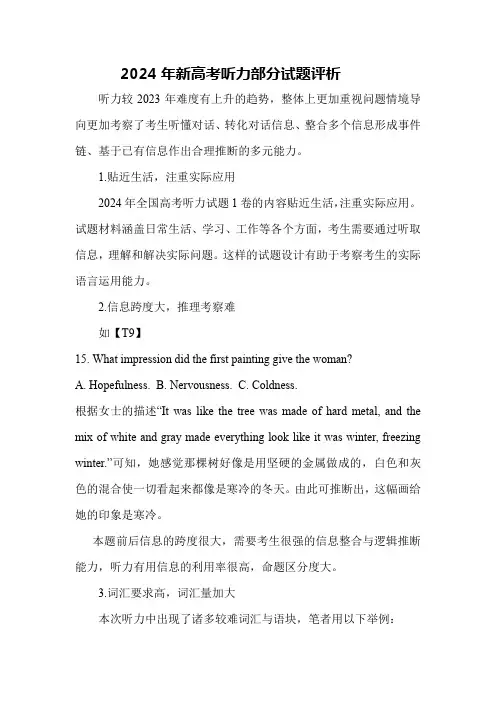
2024年新高考听力部分试题评析听力较2023年难度有上升的趋势,整体上更加重视问题情境导向更加考察了考生听懂对话、转化对话信息、整合多个信息形成事件链、基于已有信息作出合理推断的多元能力。
1.贴近生活,注重实际应用2024年全国高考听力试题1卷的内容贴近生活,注重实际应用。
试题材料涵盖日常生活、学习、工作等各个方面,考生需要通过听取信息,理解和解决实际问题。
这样的试题设计有助于考察考生的实际语言运用能力。
2.信息跨度大,推理考察难如【T9】15.What impression did the first painting give the woman?A.Hopefulness.B.Nervousness.C.Coldness.根据女士的描述“It was like the tree was made of hard metal, and the mix of white and gray made everything look like it was winter, freezing winter.”可知,她感觉那棵树好像是用坚硬的金属做成的,白色和灰色的混合使一切看起来都像是寒冷的冬天。
由此可推断出,这幅画给她的印象是寒冷。
本题前后信息的跨度很大,需要考生很强的信息整合与逻辑推断能力,听力有用信息的利用率很高,命题区分度大。
3.词汇要求高,词汇量加大本次听力中出现了诸多较难词汇与语块,笔者用以下举例:Text 5焦虑M: All well,Sophie?W:Hmm. Not great. I’m just so down with writing this report.M: Are you almost done with it?W: Far from it. And I’ll get it represented in class tomorrow.Text 8为戏剧制作服装M:(10)Linda, you work on plays and shows but you are not on stage. What do you do?W:(10)I’m a costume designer. I have the actors become their characters. M: Is it a kind of, like, playing dresser?Text 9分享艺术展观感W: Hi Kevin. I’ve just got back from the Art Gallery. There’s a wonderful show of abstract art. You should have come with me.M:(14)I don’t know. Abstract art seems like children’s painting to me. Text 10早间新闻播报M: You are watching the morning news. This is Steven Johnson. Sydney and the New South Wales coast have been hit by heavy rains. Major roads, the airport, trains and buses were all thrown behind the schedule as more than a month’s worth of rain fell in just one hour during the morning rush. 由上述可知,本次听力文本中词汇语块的难度有所提高,甚至出现了“thrown behind the schedule, a month’s worth of rain ”这样考生并不熟悉的表达,尽管对解题影响不大,但也启示我们要刻意积累口语中的常用表达。
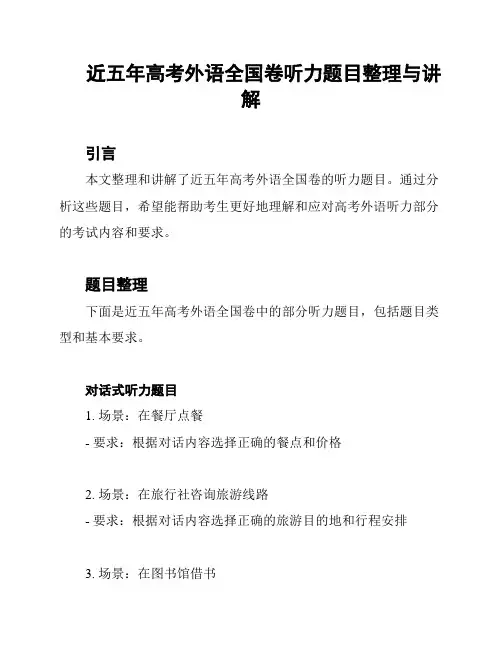
近五年高考外语全国卷听力题目整理与讲
解
引言
本文整理和讲解了近五年高考外语全国卷的听力题目。
通过分析这些题目,希望能帮助考生更好地理解和应对高考外语听力部分的考试内容和要求。
题目整理
下面是近五年高考外语全国卷中的部分听力题目,包括题目类型和基本要求。
对话式听力题目
1. 场景:在餐厅点餐
- 要求:根据对话内容选择正确的餐点和价格
2. 场景:在旅行社咨询旅游线路
- 要求:根据对话内容选择正确的旅游目的地和行程安排
3. 场景:在图书馆借书
- 要求:根据对话内容选择正确的借书流程和借书卡要求
短文理解题目
1. 题目类型:听新闻报道
- 要求:听短文后回答相关的问题,如主题、时间、地点等
2. 题目类型:听讲座
- 要求:听短文后回答相关的问题,如演讲者、演讲内容等
3. 题目类型:听导游介绍
- 要求:听短文后回答相关的问题,如景点特色、参观顺序等
讲解和备考建议
1. 注意听力技巧:在考试过程中,要学会抓住关键词,注意细节信息,并熟练掌握常见的听力表达方式。
2. 多做模拟训练:通过做各种模拟题,可以提高对不同题型的理解和应对能力。
3. 提高听力速度和准确度:多听英语材料,培养对语速和语调的敏感性,提高听力速度和准确度。
总结
通过对近五年高考外语全国卷听力题目的整理和讲解,希望能帮助考生了解题目类型和要求,并提供备考建议。
考生可以通过多做模拟题和提高听力技巧,提高应对高考外语听力部分的能力,取得更好的成绩。
厉年高中听力材料解析与试题分析一、听力材料解析在高中阶段,学生们的英语听力能力的提高对于他们的整体英语水平至关重要。
厉年高中的听力材料解析旨在帮助学生更好地理解和应对高中英语听力考试中的难点和问题。
听力材料解析的基本原则是提供听力材料的完整文本,并对重要词汇、语法结构和句子意思进行解析。
下面将以一篇听力材料为例进行解析:材料:Teacher: Good morning, class. Today, we are going to talk about the importance of environmental conservation. Do you all know what environmental conservation means?Student A: Is it about protecting the environment?Teacher: Yes, exactly. Environmental conservation refers to the protection of the environment from harmful human activities. It involves actions such as reducing pollution, preserving natural resources, and promoting sustainable development.Student B: Why is environmental conservation important?Teacher: Environmental conservation is important because it helps maintain ecological balance, ensures the availability of resources for future generations, and prevents the extinction of plant and animal species.Student C: How can we contribute to environmental conservation?Teacher: There are many ways we can contribute. We can start by reducing our energy consumption, recycling waste, planting trees, and educating others about the importance of environmental conservation.通过对上面听力材料的解析,学生们可以更好地理解其中的难点和关键信息。
一、近五年高考听力试题命题分析从表一可以看出: 1.结构形式非常稳定除2002年十段材料均为对话外,其余年份均为5段小对话,四段长对话和一段独白。
2.难度呈上升趋势 主要体现在:1)第一节小对话的轮次在增加。
1999-2000年均只有一个轮次(1999年第4个小对话为1.5轮次);2002、2003年的小对话大多为1.5至2轮次;2)语句的长度在增加。
1999-2001年的小对话稳定在14-30词之间,而2002-2003年则在21-54词之间,听力材料的总词量呈下降—上升—下降趋势。
3)第二节长对话的轮次在减少,但语句长度大大增加,最长的对话达到244词。
4)语速逐年增加,1999年语速为100 w/m ,以后每年依次以5-10 w/m 的速度增加,2003年达到了125 w/m 。
3.材料顺序安排合理每一节对话中长短语句交替进行,话轮繁简不断变化。
这样安排非常合理,能使考生在紧张之后有松弛,一张一弛,更有助于考生水平的正常发挥。
123大纲规定要求掌握的交际功能项目。
表三听力考点比较从表三可以看出:1.细节理解类试题在逐年减少。
1999-2002年细节题均稳定在9个,约占听力试题总量的50%,而2003年只有4个,只占听力试题总量的20%。
2.对主旨和说话者意图、态度的考查力度在增加。
2000、2001年对主旨和说话者意图、态度的推理判断能力考查的试题有11个,而2003年则有16个,占听力试题总量的80%。
3.强调对段落、短文和篇章的整体理解,以及对细节的推理判断能力的考查。
从表四可以看出:1.设问形式比较全面,包括what, where, why, which, how, who, when等;2.多以what为主,2003年竟然占了15题,占听力试题总量的2/3。
3.按照材料先后顺序设问。
综合以上四个表格可以得出如下结论:从题材上来看,选材广泛,紧扣实际生活,贴近时代,贴近生活,如购物、就餐、乘车、培训、问路、旅游等;从考查的交际功能来看,内容全面,涉及到邀请、购物、询问、告别、请求、懊悔、打电话等中学教学大纲规定的交际功能项目;从试题的构成来看,整个听力试题均由5段小对话,四段长对话和一段独白组成(只有2002年没有独白);从题材编排顺序来看,大致遵循“先易后难”的原则,如小对话在前,长对话在后;小对话中较难的结构形式在后(如虚拟语气等);从设问的个数来看,小对话设1个问题;长对话与独白平均每段材料设2-4个问题;从设问顺序的编排来看,一般遵循两个原则:一是按照材料中出现的先后顺序排列;二是“细节理解”题在前,“主旨大意”、“推理判断”题在后;从问题的类型来看,全是特殊疑问句,如:what, where, why, which, how, who, when等,其中what引出的问题所占比例最大,2003年有15题,占听力试题总量的2/3;从设问的形式来看,细节理解类试题在逐年减少,细节题从1999-2002年的9道题,下降到2003年的4题;主旨要义和说话者意图、态度的推断能力的考查力度在增加,从2000、2001年的11题,增加到2003年的16题;从材料的长短来看,小对话多数在20-30词之间,有的长达54词;长对话多数在120-150词之间,长的达186词(如:2001年第7段材料);从对话的轮次来看,小对话均在1-2个轮次之间,长对话均在3-5个轮次之间,短的只有1.5个轮次,长的有6.5个轮次(2003年的第9段材料);从材料播放的语速来看,语速逐年增加,1999年只有100 w/m ,以后每年以每分钟5词的速度递增,2003年达到了125词/分钟;从试题难度来看,略有起伏,但稳定在0.54-0.64之间。
历年高考英语听力材料分析第一节(共5小题,每小题1.5分,满分7.5分)听下面5段对话。
每段对话后有一个小题,从题中所给的A、B、C 三个选项中选出选项,并标在试卷的相对应位置。
听完每段对话后,你都有10秒种的时间来回答相关小题和阅读下一小题,每段对话仅读一遍。
例:How much is the shirt?A. £19.15B. £9.18C. £9.15答案是C。
1.What does the woman want to do?A. Find a place.B. Buy a map.C. Get an address.2.What does the man do for the woman?A. Repair her carB. Give her a rideC. Pick up her aunt.3.Who might Mr. Peterson be?A. A new professorB. A department headC. A company director.4. What does the man think of the book?A. Quite difficult.B. Very interesting.C. Too simple.5. What are the speakers talking about?A. WeatherB. ClothesC. News.第二节(共15小题,每小题1.5分,满分22.5分)听下面5段对话或独白,每段对话或独白后有几个小题,从题中所给的A、B、C三个选项中选出选项,并标在试卷的相对应位置。
听每段对话或独白前,你将有时间阅读各个小题,每小题5秒钟;听完后,各小题给出5秒钟的作答时间。
每段对话或独白读两遍。
听第6段材料,回答6、7小题。
6. Why is Harry unwilling to join the woman?A. He has a pain in his knee.B. He wants to watch TV.C. he is too lazy.7. What will the woman probably do next?A. Stay at home.B. Take Harry to hospital.C. Do some exercise.听第7段对话,回答8、9小题。
历年高考英语听力材料分析
第一节(共5小题,每小题1.5分,满分7.5分)
听下面5段对话。
每段对话后有一个小题,从题中所给的A、B、C 三个选项中选出选项,并标在试卷的相对应位置。
听完每段对话后,你都有10秒种的时间来回答相关小题和阅读下一小题,每段对话仅读一遍。
例:How much is the shirt?
A. £19.15
B. £9.18
C. £9.15
答案是C。
1.What does the woman want to do?
A. Find a place.
B. Buy a map.
C. Get an address.
2.What does the man do for the woman?
A. Repair her car
B. Give her a ride
C. Pick up her aunt.
3.Who might Mr. Peterson be?
A. A new professor
B. A department head
C. A company director.
4. What does the man think of the book?
A. Quite difficult.
B. Very interesting.
C. Too simple.
5. What are the speakers talking about?
A. Weather
B. Clothes
C. News.
第二节(共15小题,每小题1.5分,满分22.5分)
听下面5段对话或独白,每段对话或独白后有几个小题,从题中
所给的A、B、C三个选项中选出选项,并标在试卷的相对应位置。
听
每段对话或独白前,你将有时间阅读各个小题,每小题5秒钟;听完后,各小题给出5秒钟的作答时间。
每段对话或独白读两遍。
听第6段材料,回答6、7小题。
6. Why is Harry unwilling to join the woman?
A. He has a pain in his knee.
B. He wants to watch TV.
C. he is too lazy.
7. What will the woman probably do next?
A. Stay at home.
B. Take Harry to hospital.
C. Do some exercise.
听第7段对话,回答8、9小题。
8. When will the man be home from work?
A. At 5:45
B. At 6:15
C. At 6:50
9. Where will the speakers go?
A. The Green House Cinema.
B. The New State Cinema.
C.
The UME Cinema.
听第8段对话,回答第10至12题。
10. How will the speakers go to New York?
A. By air.
B. By taxi.
C. By bus.
11. Why are the speakers making the trip?
A. For business.
B. For shopping.
C. For holiday.
12. What is the probalbe relationship between the speakers?
A. Driver and passenger
B. Husband and wife
C. Fellow workers.
听第9段对话,回答第13至16题。
13. Where does this conversation probably take place?
A. In a restaurant.
B. In an office.
C. In a classroom.
14. What does John do now?
A. He’s a trainer.
B. He’s a tour guide.
C. He’s a college student.
15. How much can a new person earn for the first year?
A. $10,500.
B. $12,000.
C. $15,000.
16. How many people will the woman hire?
A. Four
B. Three
C. Two
听第10段材料,回答第17至20题。
17. How long has the speaker lived in a big city?
A. One year.
B. Ten years.
C. Eighteen years
18. What is the speaker’s opinion on public transport?
A. It’s comfortable
B. It’s time-saving
C. It’s che ap.
19. What is good about living in a small town?。